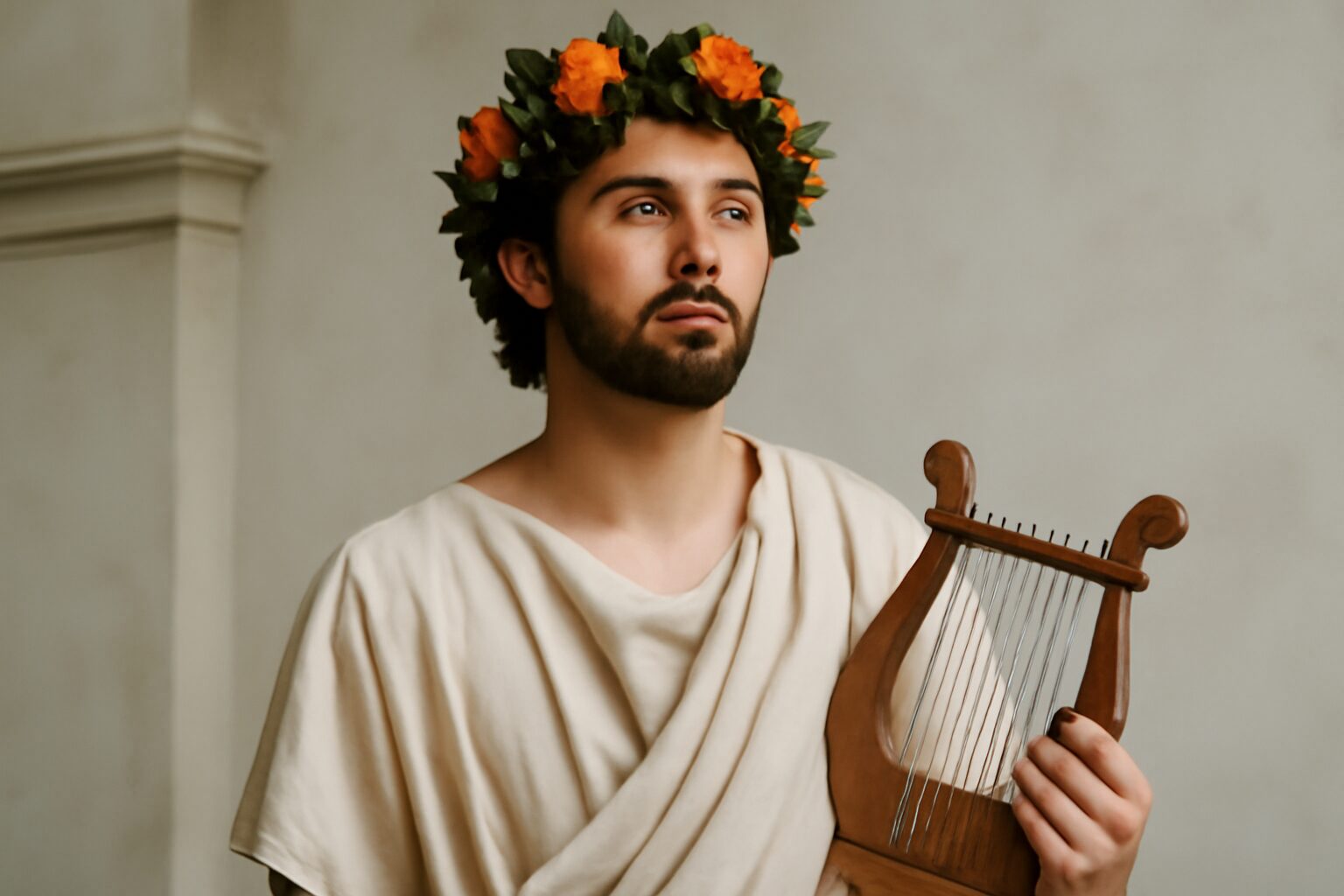Hymenaios: The God of Marriage and Wedding Songs
In Greek mythology, Hymenaios (or Hymen) was the divine embodiment of marriage ceremonies, wedding feasts, and the joyous songs that accompanied them. Often depicted as a handsome young man carrying a torch and wearing a floral crown, he symbolized the sacred union between partners and the celebration of love.
Origins and Mythology
The origins of Hymenaios are somewhat unclear, with different myths offering varying accounts. Some traditions describe him as the son of Apollo and one of the Muses, while others claim he was a mortal youth who was deified after his tragic death. One popular legend tells of Hymenaios disguising himself as a woman to follow his beloved into a religious rite—only to save her and other maidens from pirates, earning the gods' favor.
His name became synonymous with the hymenaios, the traditional wedding song sung by Greek choruses to bless newlyweds. These songs invoked his presence to ensure a happy and fruitful marriage.
Powers and Role
Hymenaios presided over all aspects of matrimony, from the ceremonial rites to the consummation of marriage. His blessings were sought to ensure harmony, fertility, and enduring love between couples. Unlike other gods associated with love, such as Eros (passionate desire) or Aphrodite (beauty and attraction), Hymenaios specifically governed the sacred and social institution of marriage.
His presence was considered essential at weddings—if the wedding hymns were poorly performed or omitted, it was seen as a bad omen for the marriage. Conversely, his favor was believed to bring prosperity and happiness to the union.
Relationships and Worship
Hymenaios was closely associated with other deities of love and celebration, including Aphrodite, Dionysus, and the Graces. He often appeared in artistic depictions alongside Erotes (winged love gods) or in wedding processions.
Though not as widely worshiped as major Olympians, Hymenaios was invoked in wedding rituals across Greece. Brides and grooms would offer prayers and sacrifices to him, and his name was frequently called upon in wedding songs. His influence extended beyond mythology into daily life, reinforcing the cultural importance of marriage in ancient Greek society.
Legacy
The legacy of Hymenaios endures in modern language—the word hymen is derived from his name, reflecting ancient beliefs linking marriage and purity. Additionally, the tradition of wedding music and ceremonial blessings can trace its roots back to the hymns sung in his honor.
As a symbol of marital joy and unity, Hymenaios remains a poignant figure in mythology, embodying the timeless celebration of love and commitment.
Alternative Names for Hymenaios
God Name: Hymen (Roman)
The Roman equivalent of Hymenaios, Hymen is the god of marriage ceremonies, often invoked in wedding songs and rituals.
God Name: Hymenaeus (Greek)
An alternative Greek spelling or variation of Hymenaios, used in some ancient texts and poetry to refer to the god of marriage.
God Name: Thalassios (Greek)
An epithet sometimes associated with Hymenaios, derived from 'thalassa' (sea), possibly linking him to maritime weddings or ceremonies in certain traditions.
Tales about Hymenaios
The Union of Hymenaios and Aphrodite
In the golden age of the gods, Hymenaios, the divine embodiment of marriage ceremonies, found himself captivated by the unparalleled beauty of Aphrodite, the goddess of love and desire. Hymenaios, known for his melodious voice that could bless any union, composed a hymn so enchanting that it moved even the heart of the love goddess herself. Aphrodite, touched by his devotion and artistry, granted him a place among her retinue, where his songs would forever accompany the sacred bonds of love.
The Ceremony of Eternity
To honor their spiritual union, Aphrodite and Hymenaios presided over the first divine wedding on Mount Olympus. With Hymenaios leading the procession, singing hymns that wove fate and fortune into every note, and Aphrodite bestowing her blessings of eternal passion, their collaboration became the archetype for all marriages. From that day forward, no mortal or godly wedding was considered complete without invoking Hymenaios’s presence and Aphrodite’s grace.
Hymenaios and the Challenge of Ares
Not all tales of Hymenaios are filled with harmony. Once, Ares, the god of war, grew envious of the joy and peace that weddings brought to mortals, seeing them as a distraction from the glory of battle. In a fit of rage, Ares attempted to disrupt a sacred ceremony presided over by Hymenaios, sending spirits of discord to sow chaos among the attendees.
The Triumph of Harmony Over Strife
Undeterred, Hymenaios raised his voice in a powerful counter-melody, each note radiating tranquility and unity. The discordant whispers of Ares’s minions were silenced by the overwhelming force of harmony and love. Witnessing this, even Ares paused, momentarily swayed by the beauty of the song. Though war and love remain eternal opposites, this event cemented Hymenaios’s role as a protector of marital bliss against all forces of strife.
Frequently Asked Questions
Who is Hymenaios in Greek mythology?
Hymenaios is the Greek god of marriage ceremonies, feasts, and wedding songs. He is often depicted as a young man carrying a torch and a veil, symbolizing the union of marriage.
Why is Hymenaios important in Greek mythology?
Hymenaios is important because he represents the joy and sacredness of marriage in Greek culture. His presence was believed to bring blessings and harmony to weddings, making him a key figure in marital traditions.
What can we learn from the stories about Hymenaios?
From Hymenaios, we learn about the ancient Greek values placed on marriage and community celebrations. His stories highlight the cultural significance of weddings as unifying and joyous events.
How is Hymenaios relevant today?
Hymenaios' themes of love, unity, and celebration remain relevant today, as weddings continue to be important cultural and personal milestones. His symbolism can inspire modern celebrations of love and partnership.
Are there any rituals or traditions associated with Hymenaios?
Yes, ancient Greeks often invoked Hymenaios during weddings by singing hymns called 'Hymenaios' in his honor. These songs were meant to seek his blessings for a happy and prosperous marriage.













